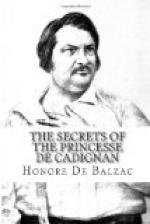“Is that all?” asked the marquise.
“Yes, all,” replied the princess. “Except that on the morning Saint-Merri was taken, a gamin came here and insisted on seeing me. He gave me a letter, written on common paper, signed by my republican.”
“Show it to me,” said the marquise.
“No, my dear. Love was too great and too sacred in the heart of that man to let me violate its secrets. The letter, short and terrible, still stirs my soul when I think of it. That dead man gives me more emotions than all the living men I ever coquetted with; he constantly recurs to my mind.”
“What was his name?” asked the marquise.
“Oh! a very common one: Michel Chrestien.”
“You have done well to tell me,” said Madame d’Espard, eagerly. “I have often heard of him. This Michel Chrestien was the intimate friend of a remarkable man you have already expressed a wish to see,—Daniel d’Arthez, who comes to my house some two or three times a year. Chrestien, who was really killed at Saint-Merri, had no lack of friends. I have heard it said that he was one of those born statesmen to whom, like de Marsay, nothing is wanting but opportunity to become all they might be.”
“Then he had better be dead,” said the princess, with a melancholy air, under which she concealed her thoughts.
“Will you come to my house some evening and meet d’Arthez?” said the marquise. “You can talk of your ghost.”
“Yes, I will,” replied the princess.
CHAPTER II
DanielD’ARTHEZ
A few days after this conversation Blondet and Rastignac, who knew d’Arthez, promised Madame d’Espard that they would bring him to dine with her. This promise might have proved rash had it not been for the name of the princess, a meeting with whom was not a matter of indifference to the great writer.
Daniel d’Arthez, one of the rare men who, in our day, unite a noble character with great talent, had already obtained, not all the popularity his works deserve, but a respectful esteem to which souls of his own calibre could add nothing. His reputation will certainly increase; but in the eyes of connoisseurs it had already attained its full development. He is one of those authors who, sooner or later, are put in their right place, and never lose it. A poor nobleman, he had understood his epoch well enough to seek personal distinction only. He had struggled




